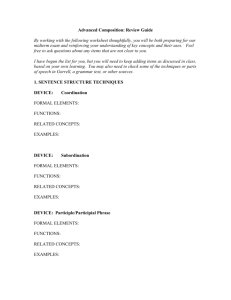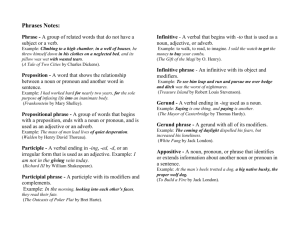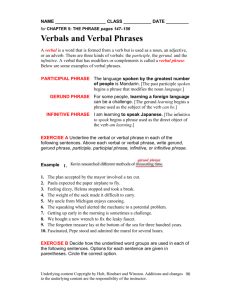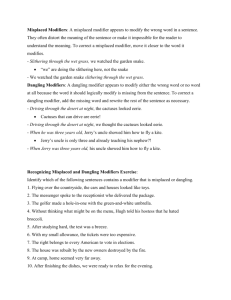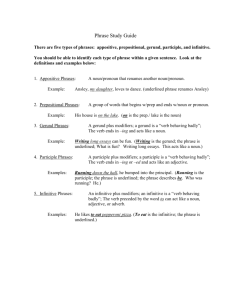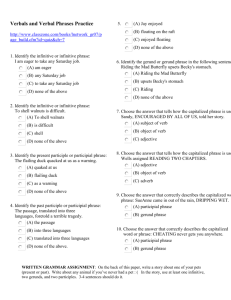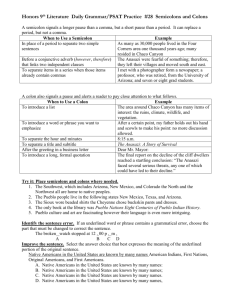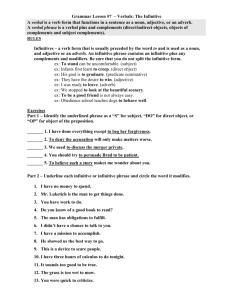Shurley English Level 8 Student Textbook
advertisement
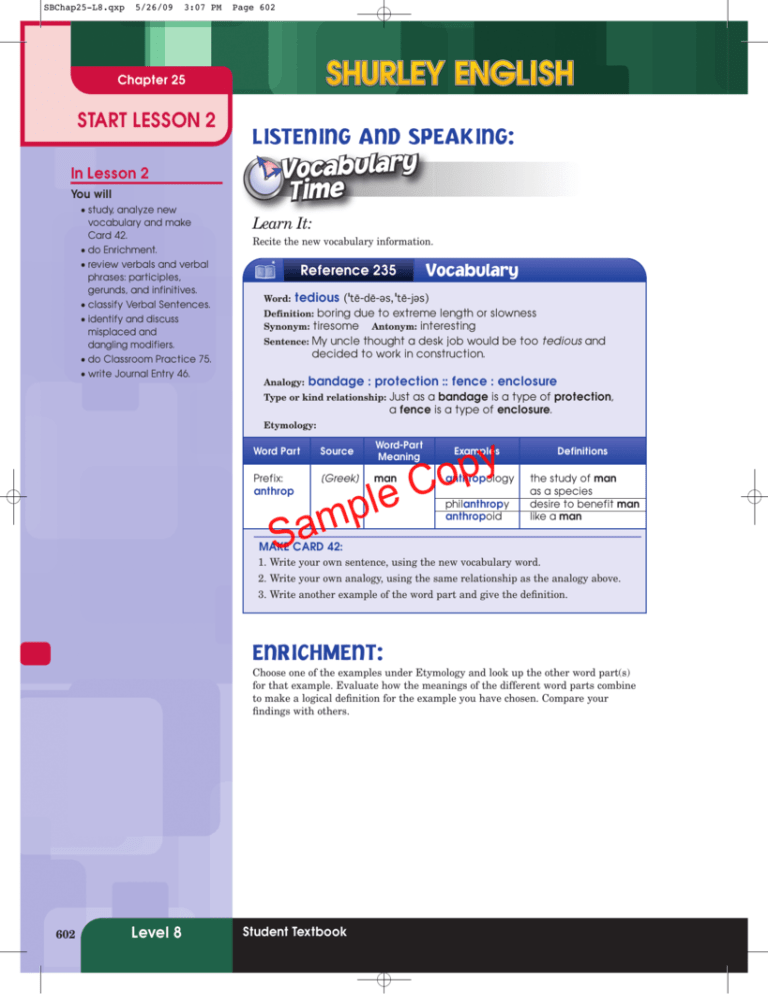
SBChap25-L8.qxp 5/26/09 3:07 PM Page 602 Chapter 25 START LESSON 2 LISTENING AND SPEAKING: In Lesson 2 You will • study, analyze new vocabulary and make Card 42. • do Enrichment. • review verbals and verbal phrases: participles, gerunds, and infinitives. • classify Verbal Sentences. • identify and discuss misplaced and dangling modifiers. Learn It: Recite the new vocabulary information. Word: tedious (ˈtē-dē-əs, ˈtē-jəs) Definition: boring due to extreme length or slowness Synonym: tiresome Antonym: interesting Sentence: My uncle thought a desk job would be too tedious and decided to work in construction. • do Classroom Practice 75. • write Journal Entry 46. Vocabulary Reference 235 Analogy: bandage : protection :: fence : enclosure Type or kind relationship: Just as a bandage is a type of protection, a fence is a type of enclosure. Etymology: Word Part Source e l p am Prefix: anthrop [Greek] y p Co Word-Part Meaning man S Examples anthropology philanthropy anthropoid Definitions the study of man as a species desire to benefit man like a man MAKE CARD 42: 1. Write your own sentence, using the new vocabulary word. 2. Write your own analogy, using the same relationship as the analogy above. 3. Write another example of the word part and give the definition. ENRICHMENT: Choose one of the examples under Etymology and look up the other word part(s) for that example. Evaluate how the meanings of the different word parts combine to make a logical definition for the example you have chosen. Compare your findings with others. 602 Level 8 Student Textbook SBChap25-L8.qxp 5/26/09 3:07 PM Page 603 Chapter 25 Lesson 2 Review It: 1. Participle: Is there an adjective that ends in -ed, -en, -t, or -ing and that is made from a verb? Participial Phrase: Is the participle followed by a prepositional phrase or an object that relates to the participle? 2. Gerund: Is there a noun that ends in -ing and that is made from a verb? Gerund Phrase: Is the gerund followed by a prepositional phrase or an object that relates to the gerund? 3. Infinitive: Is there a to with a verb after it? Infinitive Phrase: Is the infinitive followed by a prepositional phrase or an object that relates to the infinitive? Apply It: Use the Question and Answer Flow to classify the Verbal Sentences orally with your teacher. Chapter 25: Lesson 2 Verbal Sentences 1. The student writing on the board is Melissa. e l p am 2. Riding motorcycles is my hobby. 3. He still needs to complete an application. S Verbal Sentence 1: A SN y p Co PAdj The student writing on the board LV PrN is Melissa. 1. 2. 3. 4. 5. 6. 7. 8. 9. Who is Melissa? student - SN What is being said about student? student is - V Student is who? Melissa - verify the noun Does Melissa mean the same thing as student? Yes. Melissa - PrN Is – LV Which student? (the one) writing on the board - Adj The - A Verbal check: For a participle: Is there an adjective that ends in -ed, -en, -t, or -ing and that is made from a verb? Yes. Writing - participle, adjective Is the participle followed by a prepositional phrase or an object? Yes. Prepositional phrase - on the board Participial phrase – writing on the board For a gerund: Is there a noun that ends in -ing and that is made from a verb? No. For an infinitive: Is there a to with a verb after it? No. Continued on next page. >>> Student Textbook Level 8 603 SBChap25-L8.qxp 5/26/09 3:07 PM Page 604 Chapter 25 Lesson 2 Verbal Sentences continued from previous page. Verbal Sentence 2: GSN LV PPA PrN Riding motorcycles is my hobby. 1. What is my hobby? Riding motorcycles - SN 2. What is being said about riding motorcycles? riding motorcycles is - V 3. Riding motorcycles is what? hobby - verify the noun 4. Does hobby mean the same thing as riding motorcycles? Yes. 5. Hobby - PrN 6. Is – LV 7. Whose hobby? my - PPA 8. Verbal check: For a participle: Is there an adjective that ends in -ed, -en, -t, or -ing and that is made from a verb? No. For a gerund: Is there a noun that ends in -ing and that is made from a verb? Yes. Riding - gerund, subject noun Is the gerund followed by a prepositional phrase or an object? Yes. Object - motorcycles. Gerund phrase – riding motorcycles For an infinitive: Is there a to with a verb after it? No. Verbal Sentence 3: SP Adv V−t y p Co IDO He still needs to complete an application. e l p am 1. Who still needs to complete an application? he - SP 2. What is being said about he? he needs - V 3. He needs what? to complete an application - verify the noun S 4. Does to complete an application mean the same thing as he? No. 5. To complete an application - DO 6. Needs – V-t 7. Needs how? still - Adv 8. Verbal check: For a participle: Is there an adjective that ends in -ed, -en, -t, or -ing and that is made from a verb? No. For a gerund: Is there a noun that ends in -ing and that is made from a verb? No. For an infinitive: Is there a to with a verb after it? Yes. To complete - infinitive, direct object Is the infinitive followed by a prepositional phrase or an object? Yes. Object - application. Infinitive phrase - to complete an application 604 Level 8 Student Textbook SBChap25-L8.qxp 5/26/09 3:08 PM Page 605 Chapter 25 Lesson 2 Learn It: MISPLACED AND DANGLING MODIFIERS A modifier is a phrase or word meant to describe or explain part of a sentence. To avoid unclear meanings, modifiers must be placed as close as possible to the word(s) they modify. Misplaced and Dangling Modifiers Reference 236 MISPLACED MODIFIERS The word misplace means to put in the wrong place. A misplaced modifier is a word or phrase that is not correctly placed in a sentence. Sentences with misplaced modifiers often sound awkward, confusing, illogical, or unintentionally funny. To correct a misplaced modifier, move it next to or close to the word it modifies. Confusing: Boys searched for crawdads wading in the creek. (Are the crawdads wading in the creek?) Improved: Boys wading in the creek searched for crawdads. (Boys are wading in the creek.) DANGLING MODIFIERS Modifiers must modify words that are named in the sentence. A dangling modifier is a phrase that attempts to modify a word that has been left out. Dangling modifiers are usually verbal phrases that occur at the beginning of sentences, but they can also appear at the end. The meaning of the sentence is left dangling. The result is an illogical sentence that has a different meaning from what is intended because a word or words are omitted. To correct a dangling modifier, rewrite the sentence to include the missing word(s) being modified. e l p am y p Co S Confusing: Sitting on my deck, the stars seemed near. (Are the stars sitting on my deck?) Improved: Sitting on my deck, I thought the stars seemed near. (I am sitting on my deck.) Improved: As I was sitting on my deck, the stars seemed near. (I am sitting on my deck.) REVIEW Dangling modifiers need something to modify; misplaced modifiers need to be moved close to what they modify. Classroom Practice 75 It is time to practice the skills you are learning. You will use the classroom practice to apply these skills. JOURNAL WRITING 46 Write an entry in your journal. Use Reference 1 on page 1 for ideas. Student Textbook Level 8 605 SBChap25-L8.qxp 5/26/09 3:08 PM Page 606 Chapter 25 Lesson 2 Classroom Practice 75 Name:______________________________________________________________________________________ Date:________________________ DANGLING AND MISPLACED MODIFIERS Exercise 1: At the end of each sentence, write C if the sentence is correct, write MM if the sentence contains a misplaced modifier, and write DM if the sentence contains a dangling modifier. 1. The nurse’s aide gave a bath to the man with the wet sponge. ______ 2. The woman told me about her dead husband in the tanning salon. ______ 3. With trepidation, we watched the fire fighters enter the burning building. ______ 4. The sanitation engineer wearing the neon orange vest hoisted the can into the truck. ______ 5. Walking down the street, the wind blew fiercely. ______ Exercise 2: Rewrite the sentence, correcting the misplaced modifier. A man was talking to the dog in the back seat parking his Mercedes. ____________________________________________________________________________ ____________________________________________________________________________ y p Co Exercise 3: Rewrite the sentence, correcting the dangling modifier. While watching the floats, the Pirates of the Caribbean began to deflate. e l p am ____________________________________________________________________________ ____________________________________________________________________________ VERBAL PHRASES S Exercise 4: Underline the verbal phrase in each sentence. In the blank at the end of each sentence, write P for a Participial Phrase, G for a Gerund Phrase, or I for an Infinitive Phrase. 1. My daughter likes to ride her horse. ______ 5. I paid the two men laying the sod. ______ 2. Sally prefers playing her banjo. ______ 6. Shanna wants to cut my hair. ______ 3. He enjoys competing in tournaments. ______ 7. Solving cryptograms helps me fall asleep. ______ 4. She joked with the waiter taking our order. ______ 8. Okra fried in batter is my favorite Southern dish. ______ Exercise 5: Underline the verbal phrases and identify each one with an abbreviation and function. Participial phrase: PAdj. Gerund phrase: GSN, GDO, GOP, GPrN, or GOCN. Infinitive phrase: IAdj, IAdv, ISN, IDO, or IPrN. 1. I telephoned the people catering the reception. 4. Walking in a spring shower can be fun. 2. To accomplish our goals is important. 5. The animals howling in the woods are coyotes. 3. On Sundays, we like to gather at Grandma’s. 6. On windy nights, we enjoy telling ghost stories. End of Lesson 2 606 606 Level 8 Student Textbook
